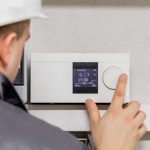How Energy-Efficient HVAC Systems Benefit the Environment
March 11, 2024 7:13 pm Leave your thoughts
Reduced Energy Consumption and Emissions
One of the most significant ways that energy-efficient HVAC systems benefit the environment is by reducing energy consumption and emissions. Traditional HVAC systems can be energy-intensive, leading to high electricity usage and associated greenhouse gas emissions. Energy-efficient HVAC systems, on the other hand, are designed to minimize energy waste and optimize performance, resulting in lower energy consumption and reduced carbon footprint. By upgrading to energy-efficient heating and cooling solutions, homeowners and building operators can significantly decrease their energy bills and contribute to a cleaner and healthier environment by lowering their carbon emissions.
Lower Carbon Footprint
HVAC systems account for a considerable portion of the energy consumption and greenhouse gas emissions in residential and commercial buildings. By investing in energy-efficient HVAC systems, building owners can lower their carbon footprint and decrease their environmental impact. Energy-efficient heating and cooling technologies, such as high-efficiency furnaces, air source heat pumps, and variable refrigerant flow systems, are designed to deliver the same level of comfort while using less energy and emitting fewer greenhouse gases. By reducing carbon emissions associated with heating and cooling, energy-efficient HVAC systems play a crucial role in mitigating climate change and promoting environmental sustainability.
Resource Conservation
Energy-efficient HVAC systems not only help reduce carbon emissions but also contribute to resource conservation. By using energy more efficiently, these systems minimize the demand for fossil fuels and electricity, which are valuable resources that have significant environmental impacts. By conserving resources, energy-efficient HVAC systems help reduce the extraction, processing, and transportation of raw materials used for energy production, thereby decreasing environmental degradation and preserving natural habitats. Conserving resources through energy efficiency is essential for promoting sustainability and protecting the environment for future generations.
Improved Air Quality
In addition to reducing energy consumption and emissions, energy-efficient HVAC systems can also improve indoor air quality, which has important implications for human health and the environment. Traditional HVAC systems can accumulate dust, allergens, and pollutants, leading to poor indoor air quality and potential health risks. Energy-efficient HVAC systems are designed to filter and circulate air more effectively, removing contaminants and improving ventilation. By providing cleaner and healthier indoor air, energy-efficient heating and cooling solutions can help reduce respiratory illnesses, enhance occupant comfort, and create a safer and more sustainable indoor environment.
Promote Renewable Energy Integration
Energy-efficient HVAC systems can also facilitate the integration of renewable energy sources, such as solar power and geothermal energy, into residential and commercial buildings. By reducing energy demand and optimizing performance, energy-efficient heating and cooling technologies make it easier to supplement traditional energy sources with clean, renewable energy. For example, a well-insulated and energy-efficient building with a geothermal heat pump system can rely on the earth’s consistent temperature for heating and cooling, reducing the reliance on fossil fuels and lowering greenhouse gas emissions. By promoting the adoption of renewable energy solutions, energy-efficient HVAC systems play a crucial role in advancing the transition to a more sustainable and environmentally friendly energy system.
Long-Term Environmental Benefits
While the upfront costs of energy-efficient HVAC systems may be higher than traditional systems, the long-term environmental benefits far outweigh the initial investment. Energy-efficient heating and cooling technologies deliver ongoing energy savings, reduced emissions, and improved environmental performance over the lifespan of the system. By choosing energy-efficient HVAC systems, homeowners and building operators can lower their operating costs, increase property value, and contribute to a more sustainable and resilient built environment. In the face of climate change and environmental challenges, investing in energy-efficient HVAC systems is a crucial step towards reducing our environmental impact and creating a cleaner, greener future.
Summary
Energy-efficient HVAC systems offer a range of environmental benefits that can help mitigate climate change, reduce resource consumption, improve indoor air quality, and promote sustainability. By lowering energy consumption and carbon emissions, conserving resources, improving air quality, facilitating renewable energy integration, and delivering long-term environmental benefits, energy-efficient heating and cooling solutions play a critical role in creating a more sustainable and environmentally friendly built environment. As we strive to address the challenges of climate change and promote environmental stewardship, transitioning to energy-efficient HVAC systems is a vital step towards achieving a more sustainable and resilient future for generations to come.
Need a HVAC Contractor in Oklahoma City, OK?
Family owned and operated since 1994, we have earned a reputation for providing quality, timely, and affordable heating and air conditioning services to the residents and businesses of Oklahoma City and surrounding areas. With a combined 39 years of experience, our knowledgeable technicians specialize in a wide range of services including the sales, service, and installation of heating and air conditioning systems, filtration systems, air decontaminating UV lamps, dehumidifiers, humidifiers, carbon monoxide detectors, preventative maintenance, air quality systems, and more. We pride ourselves on installing high-efficiency comfort systems designed to be the most cost-effective on the market and geared to your particular property. Contact us today to learn more about what we can do for you!
Categorised in: HVAC
This post was written by admin
